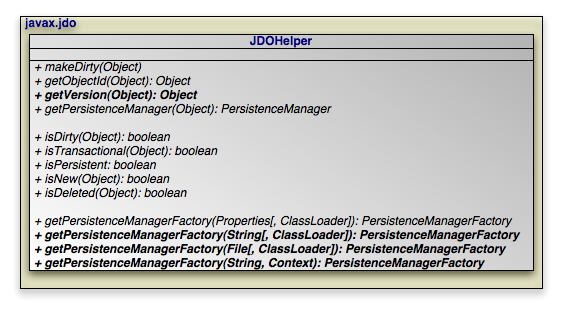
![[Note]](img/note.gif) | Note |
|---|---|
Kodo includes the
|
Applications use the
JDOHelper for three
types of operations: persistence-capable operations,
lifecycle operations, and
PersistenceManagerFactory construction.
We investigate each below.
public static void makeDirty (Object pc, String fieldName); public static Object getObjectId (Object pc); public static Object getVersion (Object pc); public static PersistenceManager getPersistenceManager (Object pc);
We have already seen the first two persistence-capable
operations, makeDirty and
getObjectId. Given a persistence-capable
object and the name of the field that has been modified, the
makeDirty method notifies the JDO
implementation that the field's value has changed so that it can
write the new value to the datastore. JDO usually tracks field
modifications automatically; the only time you are required to use
this method is when you assign a new value to some index of a
persistent array.
The getObjectId method returns the JDO
identity object for the persistence-capable instance given as an
argument. If the given instance is not persistent, this method
returns null.
![[Note]](img/note.gif) | Note |
|---|---|
Under some settings, your JDO implementation may have to insert
a newly-persisted object into the datastore before it can determine
the object's JDO identity. Thus, calling |
The getVersion method returns the version
object of the given persistence-capable instance. Version objects are
used to ensure that concurrent optimistic transactions don't overwrite
each other's changes. For more information on optimistic transactions,
see Section 9.1, “Transaction Types”. Standard JDO versioning
strategies are discussed in
Section 15.10, “Version”.
If the argument to getVersion is not persistent
or does not have a version, the method returns null.
The final persistence-capable operation,
getPersistenceManager, is self-explanatory.
It simply returns the PersistenceManager
that is managing the persistence-capable object supplied as an
argument. If the argument is a transient
object, meaning it is not managed by a
PersistenceManager, null
is returned.